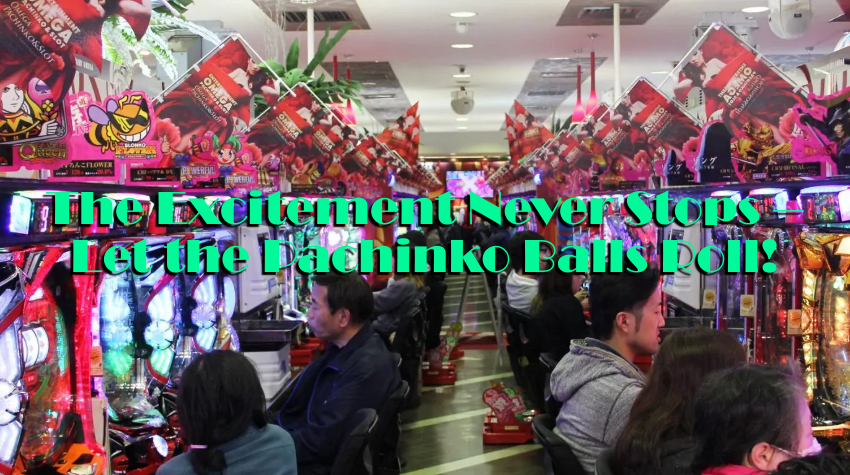Introduction to Foreigners Playing Pachinko
Pachinko is one of Japan’s most iconic gaming traditions—a hybrid of slot machines, pinball, and arcade gaming. For locals, it’s part of daily entertainment, but for many tourists and expats, it’s a fascinating cultural experience. The flashing lights, ringing bells, and rows of dedicated players make pachinko parlors unlike any other gaming venue in the world. But one big question remains: Can foreigners playing Pachinko actually win big? The answer lies in understanding the rules, the exchange system, and the unwritten etiquette of Pachinko. This comprehensive guide will take you step by step through everything you need to know as a non-Japanese player—from legal issues to strategies and cultural expectations.
The Basics of Pachinko for Foreign Players
How Pachinko Works
For newcomers, especially foreigners playing Pachinko for the first time, the process can feel confusing. Unlike Western-style slot machines, where you insert coins or digital credits, Pachinko relies on metal balls. These serve both as the stake and the potential prize currency.
- Buying Balls:
Players purchase a tray of small steel balls at the parlor’s counter. The cost is usually around ¥1,000 for 250 balls, though exact pricing may vary depending on the parlor. - Playing the Machine:
The balls are loaded into a machine and shot upward into a vertical board filled with hundreds of pins. Using a dial or lever, players control the strength and angle of the shot. - Scoring Pockets:
If a ball lands in certain designated pockets, the machine rewards the player with bonus balls. Modern digital pachinko machines often trigger colorful animations, mini-games, or slot-style reels when this happens, adding an extra layer of excitement. - The Goal:
The aim is to accumulate as many balls as possible. These balls are later exchanged for tokens or prizes, which can then be converted into cash through the famous pachinko three-store exchange system.
Unlike traditional casino games, Pachinko requires both luck and a degree of skill in controlling ball shots. This mix makes it appealing not only to locals but also to foreigners curious about Japanese gaming culture.
Why Foreigners Love Pachinko
For many travelers, playing Pachinko is not about making money—it’s about experiencing something uniquely Japanese. Foreigners are often fascinated by pachinko parlors for several reasons:
- A Cultural Adventure:
Pachinko is deeply ingrained in Japanese society. The buzzing parlors, neon lights, and sheer volume of machines create an atmosphere unlike anything in Western casinos or arcades. For tourists, stepping into a parlor feels like walking into a slice of everyday Japan. - Immersive Atmosphere:
The sound of thousands of balls clattering, combined with flashy screens, ringing bells, and animated characters, makes Pachinko an adrenaline-fueled experience. Many foreigners describe it as sensory overload—in the best way possible. - Accessibility Without Language:
Even if you don’t read or speak Japanese, you can still play Pachinko. Staff are often willing to assist, especially in larger parlors in Tokyo, Osaka, and Kyoto. The basic mechanics—buying balls, shooting them, and collecting more—are easy to understand after watching locals for a few minutes. - Tourist-Friendly Parlors:
Some pachinko halls in tourist-heavy areas even offer English instructions, making it easier for foreigners to try their luck. For visitors seeking authentic experiences beyond shrines and sushi, Pachinko offers a uniquely modern Japanese pastime. - Entertainment Over Profits:
While locals may chase jackpots, foreigners often play Pachinko for the novelty. Winning is exciting, but most visitors find the entertainment value to be worth the modest amount spent.
Pachinko Gambling Laws: What Foreigners Must Know
Is Pachinko Gambling Legal in Japan?
Technically, gambling is illegal in Japan, but Pachinko exists in a legal gray area. Instead of paying out cash directly, parlors reward winners with prizes or tokens, which can then be exchanged at third-party shops for cash. This loophole keeps Pachinko legal.
Can Foreigners Participate Without Issues?
Yes. There are no restrictions preventing foreigners from playing Pachinko. As long as you are over 18 (the legal age), you are welcome. Many parlors even have staff trained to assist tourists.
🔗 Learn more about Pachinko’s roots in our beginner guide: What Is Pachinko?
Pachinko Ball Exchange System Explained
The Process for Foreign Players
For newcomers and especially foreigners playing Pachinko, the ball exchange system can seem confusing at first. Unlike slot machines in casinos, Pachinko is structured to comply with Japanese gambling laws, which officially prohibit cash payouts inside the parlor. Instead, a creative system is used to allow players to turn their winnings into money without directly violating regulations.
Here’s how it works step by step:
- Purchase Balls at the Counter
- Players start by buying buckets of small steel balls, usually at a rate of ¥1 or ¥4 per ball, depending on the parlor and machine.
- These balls act both as your stake (what you “bet” into the machine) and as a unit of value for rewards.
- Play the Pachinko Machine
- The balls are launched into the vertical machine.
- As they bounce through pins, some fall into prize pockets, awarding players with more balls.
- Winning is all about accumulating as many balls as possible.
- Exchange Balls for Prizes Inside the Parlor
- When finished, players bring their balls to the counter inside the parlor.
- Instead of receiving money directly, they exchange balls for tokens or prizes, such as snacks, toys, electronics, or branded gift cards.
- These items are carefully chosen to comply with regulations—technically, the parlor is rewarding you with goods, not cash.
- Visit the Separate Exchange Shop
- Just outside or near the parlor, you’ll find a small, independent shop (often around the corner).
- These shops, which are legally separate from the Pachinko parlor, buy back the tokens or specific prizes for cash payouts.
- This final step enables the Pachinko ball exchange system to operate without being directly classified as gambling under Japanese law.
Why This System Exists
The Pachinko ball exchange system is unique to Japan because it balances the cultural popularity of Pachinko with the country’s strict gambling regulations.
- Legal Loophole: By separating the cash exchange from the gaming floor, parlors avoid being classified as casinos.
- Seamless Experience: For players, the process is quick and smooth—so much so that many tourists don’t realize the legal complexity behind it.
- Consistency Across Japan: Whether you play in Tokyo, Osaka, or smaller towns, this system is used nationwide, making it a standard practice for both locals and foreigners.
Tips for Foreign Players
- Look for the Exchange Window: Staff may not explain, but usually they will hand you a small plastic box or token that can be exchanged nearby.
- Don’t Be Shy to Ask: If you’re confused, you can ask staff, “Where exchange?”—many parlors in tourist-heavy areas have English signage or staff who understand basic English.
- Carry ID: Some parlors may require identification if you are claiming large winnings.
Why This System Exists
The “three-store system” prevents Pachinko from being classified as direct gambling. The parlor sells balls, the player exchanges them for tokens, and a third-party shop buys those tokens back for cash.
Table: Example of Ball Exchange
| Balls Won | Approx. Value | Prize Form |
| 500 | ¥1,000 | Snack prize / small toy |
| 2,000 | ¥4,000 | Electronics / mid-size token |
| 5,000+ | ¥10,000+ | Gold-plated token for cash |
The Experience of Foreigners Playing Pachinko
First Impressions
Foreigners often describe pachinko parlors as overwhelming—rows of machines buzzing with flashing screens, heavy cigarette smoke (though many parlors now offer smoke-free areas), and the sound of thousands of balls clattering at once.
Language Barrier
- Challenge: Most machines and signs are in Japanese.
- Solution: Staff often assist tourists, and some parlors in big cities like Tokyo or Osaka provide English guidance.
Can Foreigners Actually Win at Pachinko?
Payout Potential
Yes, foreigners can win. The machines do not discriminate between local and foreign players. Winning depends on chance and machine mechanics.
Limitations to Consider
- Exchange rates for prizes may vary slightly between parlors.
- Big wins are possible, but consistent profits are unlikely due to the house edge.
Tips and Strategies for Foreigners
Choosing the Right Parlor
- Look for large, reputable chains (e.g., Maruhan, Dynam).
- Tourist-friendly parlors often have English signage.
Playing Smart
- Start small to understand machine mechanics.
- Watch locals to see which machines seem “hot.”
- Always set a spending limit—Pachinko can be addictive.
Pachinko Etiquette for Foreign Players
Do’s
- Respect personal space—don’t hover too closely behind others.
- Keep noise to a minimum; parlors are loud enough already.
- Return balls to the tray when finished.
Don’ts
- Don’t try to pocket balls—this is strictly prohibited.
- Don’t use phones excessively at the machines.
- Don’t disrupt locals; many treat Pachinko seriously.
Pachinko and Japanese Culture
Social Importance
For many Japanese players, Pachinko is more than a game—it’s a routine. Some visit parlors daily, viewing it as a social activity or stress relief.
Pachinko as a Tourist Attraction
Foreigners now treat Pachinko as a must-try cultural experience, much like karaoke or capsule hotels. Travel agencies even include pachinko stops in guided tours.
Challenges for Foreign Players
Legal and Financial Risks
- While Pachinko is legal, misuse of balls or violating parlor rules can lead to trouble.
- Big wins may require ID for exchange in some parlors.
Addiction Risks
Pachinko is notorious in Japan for causing gambling addiction. Foreign players should treat it as entertainment, not an income source.
Conclusion: Should Foreigners Play Pachinko?

\ The Excitement Never Stops – Let the Pachinko Balls Roll! /
The answer is yes—with caution. Pachinko offers foreigners a unique window into Japanese culture, combining the thrill of gaming with a fascinating social experience. While winning big is possible, the true reward lies in enjoying the game for what it is: a cultural adventure.
Casino Savvy recommends that tourists view Pachinko as a fun diversion, rather than a means to generate profit. Play responsibly, know the exchange system, and immerse yourself in the atmosphere of Japan’s legendary parlors.
👉 For more insights into Japanese gaming culture, visit Casino Savvy: https://free-gamblings.com/









Comments